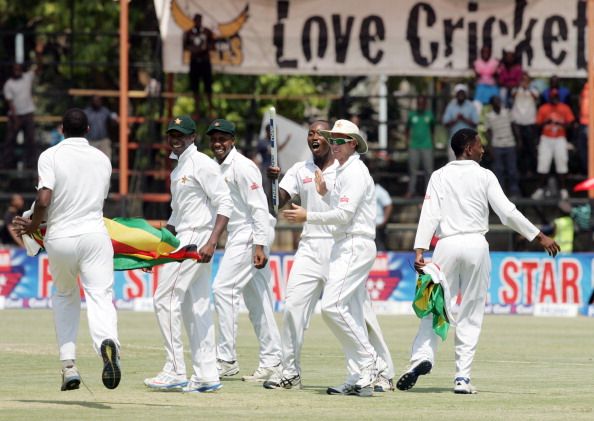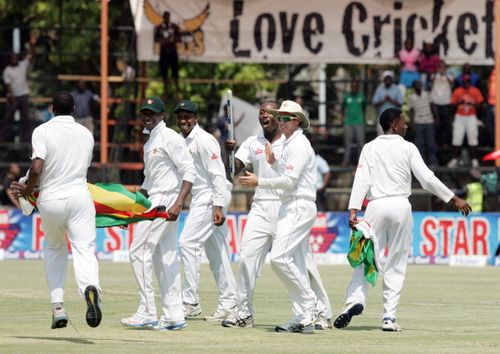
T20 cricket: Foreseeing the larger interests of the game
With the amount of T20 games being played these days, thanks to the countless number of domestic leagues which have formed across the globe, one tends to wonder if the ICC T20 World Cup is really required. And if it is, what purpose does it serve?
One of the things I feel the ICC is trying to achieve with a T20 World Cup is to globalize the game. Cricket, on a whole, is played seriously by very few nations, and to spread the game, T20 seems to be the most viable option. Also, being such a short tournament, the number of mismatches between the top teams and the minnows won’t be much of an issue as it is in the case of the ODI World Cup.
But one wonders – what happens to the associate teams after the World Cup is over. Fair enough, the ICC have tried giving these teams an insight how things work at the international level, but the point is, does anyone track their progress once the tournament gets over?

Zimbabwe players celebrate victory over Pakistan on September 14, 2013 during the fifth day of the second Test against at the Harare Sports Club. (JEKESAI NJIKIZANA/AFP/Getty Images)
Let’s take the case of Kenya. After their unexpected but remarkable performance during the World Cup in 2003, where they eventually reached the semi-finals, there were calls for Kenya to get Test status. In the end, they weren’t even close to playing a Test match and are now completely out of the international scene.
Similarly, Ireland performed above expectations and reached the Super 8 stage in the 2007 World Cup. They have improved from then on, but their opportunities at the international level have been very limited. I am very curious to know what is the status of associates like Namibia and Bermuda, who have played at the highest level but are no longer to be seen.
More or less everyone has been touched how players from the war-torn nation of Afghanistan have put up a spirited performance. But once again the question arises – what lies for them after the World Cup? Will the ICC ensure that these teams don’t just make headlines only during the main events and then fade into the oblivion?
Boyd Rankin and Eoin Morgan are two cricketers who have switched their international allegiance from Ireland to England to pursue their dreams of playing Test cricket. One could easily blame them for changing loyalties, but is it their fault? They feel they have got the game to compete with top international cricketers, but unfortunately, are restricted since their country isn’t competent enough.
This is where I feel the ICC and the other cricket boards should take up the responsibility to foresee the larger interests of the game. To begin with, top associate teams must be given opportunities to take part in domestic first class tournaments of established cricketing nations. Let them have a taste of how cricket is played in different parts of the world. Apart from giving them the right exposure, it will also help them improve their cricketing standards.
This can be applied to even teams like Bangladesh and Zimbabwe, who have been in the international circuit for a reasonably long duration. Another suggestion, though highly improbable, is that each domestic T20 team must have a player from an associate team. It will give them the experience of playing in front of packed stadiums, quality opposition and also develop their game by spending time with the international stars.
With most T20 teams owned in a franchisee system, and monetary gains being the prime objective, it will be pretty hard to convince them. However, they must realize what the game is giving to them, and it is their moral responsibility to ensure that the game attracts a global audience. Sometimes, life’s not all about a profit or loss statement; one must do things for the greater good!